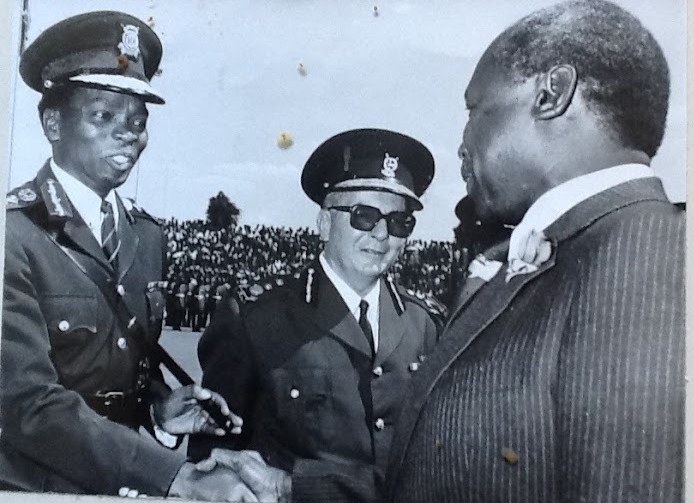The story of Reuben Nzioka Mutua is not like any other colonial hero tale and his name may not ring a bell to many Kenyans but those who lived in his time can tell a story about him.
Mutua served as the second commissioner of prisons during the late President Moi’s regime.
Although he is not talked about in Kenya’s history it is fair to say he is among few people who showed dedication to their work and was famed for his principled stance.
While he bossed the prisons, Charles Njonjo was the Arttoney General and at one time Mutua blatantly refused to release a murder convict as ordered by Njonjo who was feared by many civil servants.
This was in 1981 and the prisoner identified as Benson Kariuki was serving 10 years in prison for killing his girlfriend for canceling their wedding.
Kariuki had already served four years after appealing the death sentence and his name was not in the list of those earmarked for presidential amnesty in 1981.
However, Njonjo wanted Kariuki’s name snuck into the list at the last minute and bring the number to 2173.
This angered Mutua who loved following the law because the inmates supposed to be released should have at least six months to complete their sentence and should have already served a third of their sentence.
According to a biography about him, Mutua when handed the list took out Kariuki’s name and compiled another list.
Born in 1932 at Kiitini village, Kalama sub county of Machakos county Mutua grew up like any other village kid.
His thirst for education forced him to harvest sisal for sale to pay his school fees.
After completing his university education, he joined the police force at 23 years and became an Assistant Inspector.
He rose through the ranks to become Senior Assistant Commissioner of Police in charge of Central Province and in 1977 the late President Jomo Kenyatta promoted him to Commissioner of Prisons from Provincial Police officer.
Mutua took his duties with dignity and integrity and brought prison reforms that made the correctional facilities more humane.
For the years he served in the position, he ensured that warders were trained, the living conditions of the facilities improved, vocational training for inmates was introduced, and measures to reduce offending rates.
Due to his dedication to service, he was nicknamed ‘Mutua wa Magereza’ and was rewarded with land in Emali by President Moi.
Mutua died on March 26, 1986, in Nairobi hospital two days after a grisly road accident where his wife sustained serious injuries. His vehicle Peugeot 504 collided with another car near Jomo Kenyatta International Airport and Mombasa Road junction.
President Moi attended his burial in Emali and eulogized him as a patriotic person who cared for the welfare of others. Matthew Guy Muli the then Attorney General defined him as a humble person who did his duties with humility.
Madaraka day is fast approaching and his family remembers him 37 years later as a family man, a patriarch who ensured everyone is well taken care of.
His daughter Lydia Mutua says her father valued education and made sure not only his children but relatives acquired education.
Lydia disclosed that her father stocked to rules even at home and that the family did not enjoy government favors despite his position.
“He would not allow us to be taken to school with Government vehicles in fact most are the times we were dropped to school in his Peugeot 204 that could break down any time,” she said.
“He did not allow us to go to school with anything from the government store, not a pencil or pen. He would rather send us to buy from a shop on our way to school, that is how strict he was. Although he is not around his values and teachings live in us,” she added.
His wife Teresia Mutua too remembers her husband as someone who wanted his instructions followed to the latter. She narrated how at one time she was hurt by a police officer after coming out of her office despite being warned by her husband.
“Tom Mboya’s cottage was to pass through Nakuru and my husband was the then Rift Valley Provincial police officer. He came to my office at Standard Chartered Bank and warned me not to go outside no matter what I hear because there were mourners who were rioting,” she said.
“Out of curiosity, I got out of my office to see what was happening outside, no sooner had I stepped out than a police officer in camouflage hit me with a club on my knees. I fell and had to crawl back to my office and at home when my husband saw me limping my husband could only ask whether I had defied his caution,” she added.
His son Dr. Peter Mutua remembers his father as someone who did not tolerate wastage and insisted that his family make use of what was available.
“No running taps if the water was not being used, no lights on if you are not in the room, and no serving food you cannot finish, at one time, I found some of his old uniforms had their collars ‘turned’ and repaired imagine that, the Commissioner of Prisons who was, at the time, in charge of making uniforms for the other disciplined forces, recycling his uniform. We’ve realized that the only way that he had made economic progress was to spend less than he made, eliminate waste and make the best use of what he had.” said Peter.

